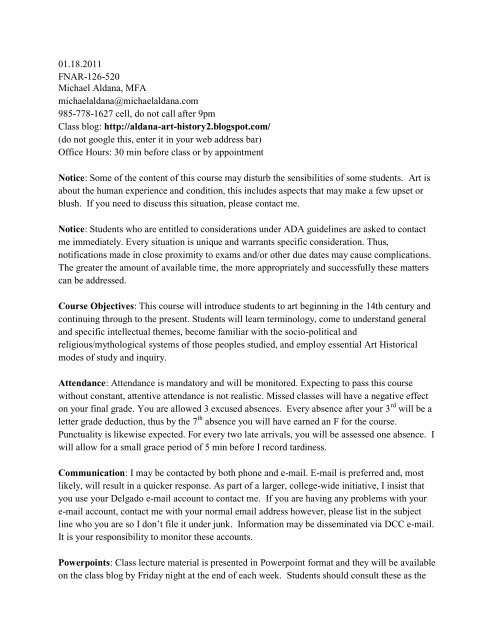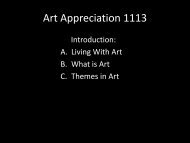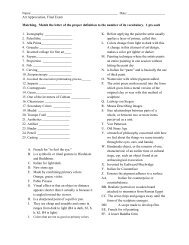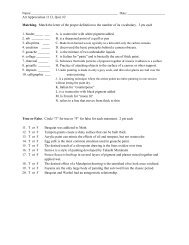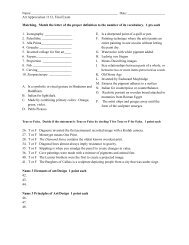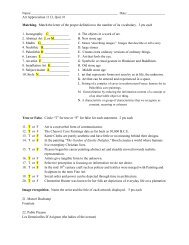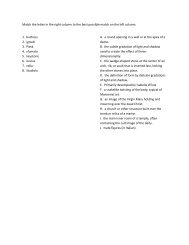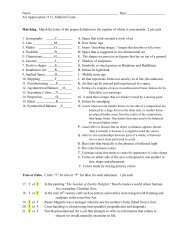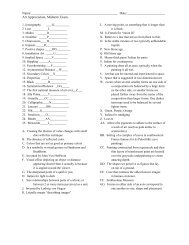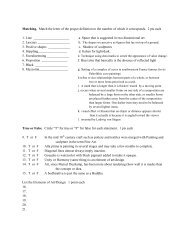Delgado Art History II Syllabus.pdf - MichaelAldana.com
Delgado Art History II Syllabus.pdf - MichaelAldana.com
Delgado Art History II Syllabus.pdf - MichaelAldana.com
- No tags were found...
You also want an ePaper? Increase the reach of your titles
YUMPU automatically turns print PDFs into web optimized ePapers that Google loves.
01.18.2011FNAR-126-520Michael Aldana, MFAmichaelaldana@michaelaldana.<strong>com</strong>985-778-1627 cell, do not call after 9pmClass blog: http://aldana-art-history2.blogspot.<strong>com</strong>/(do not google this, enter it in your web address bar)Office Hours: 30 min before class or by appointmentNotice: Some of the content of this course may disturb the sensibilities of some students. <strong>Art</strong> isabout the human experience and condition, this includes aspects that may make a few upset orblush. If you need to discuss this situation, please contact me.Notice: Students who are entitled to considerations under ADA guidelines are asked to contactme immediately. Every situation is unique and warrants specific consideration. Thus,notifications made in close proximity to exams and/or other due dates may cause <strong>com</strong>plications.The greater the amount of available time, the more appropriately and successfully these matterscan be addressed.Course Objectives: This course will introduce students to art beginning in the 14th century andcontinuing through to the present. Students will learn terminology, <strong>com</strong>e to understand generaland specific intellectual themes, be<strong>com</strong>e familiar with the socio-political andreligious/mythological systems of those peoples studied, and employ essential <strong>Art</strong> Historicalmodes of study and inquiry.Attendance: Attendance is mandatory and will be monitored. Expecting to pass this coursewithout constant, attentive attendance is not realistic. Missed classes will have a negative effecton your final grade. You are allowed 3 excused absences. Every absence after your 3 rd will be aletter grade deduction, thus by the 7 th absence you will have earned an F for the course.Punctuality is likewise expected. For every two late arrivals, you will be assessed one absence. Iwill allow for a small grace period of 5 min before I record tardiness.Communication: I may be contacted by both phone and e-mail. E-mail is preferred and, mostlikely, will result in a quicker response. As part of a larger, college-wide initiative, I insist thatyou use your <strong>Delgado</strong> e-mail account to contact me. If you are having any problems with youre-mail account, contact me with your normal email address however, please list in the subjectline who you are so I don’t file it under junk. Information may be disseminated via DCC e-mail.It is your responsibility to monitor these accounts.Powerpoints: Class lecture material is presented in Powerpoint format and they will be availableon the class blog by Friday night at the end of each week. Students should consult these as the
Grading: My grading system works as follows. Please consider these numbers indisputable.A= 100-90, B= 89-80, C= 79-70, D= 69-60 F= 59-0Grading Breakdown:Class participation and blog participation: 15%Quizzes and paper 35%Midterm Exam 25%Final Exam 25%I will not drop the lowest grade of any quiz. My thoughts on this are, if I were to drop any gradethat reflects what you learn or don’t learn in this class; what would be the point in giving a quizin the first place? No worries though, I will offer a few extra credit opportunities.Attendance and lateness will be factored into the final gradeExtra Credit: I will add extra credit assignments throughout the semester through the classblog. The extra credit will vary in its weight depending on the assignment. Some exampleswould be short papers discussing a gallery opening or show at a local gallery, art projects, orwriting short essays on a given topic.<strong>Art</strong> Across Time, 4 th edition, Volume <strong>II</strong>, The Fourteenth Century to the Present, by LaurieSchneider Adams, 2011.DO NOT DELAY IN ACQUIRING THIS TEXT. Purchasing earlier editions may save youmoney but if we have an assignment from the book and you miss something from the bookbecause it wasn’t printed in your version, the onus would be on you.Classroom Conduct: Students are expected to conduct themselves in an appropriate manner.Anything otherwise is disrespectful to yourselves, your peers, your faculty, and the educationalendeavor.1. Conversing is unacceptable. It is both distracting to those seated nearby and disruptive to theprofessor. You will be warned. You will then be asked to leave. If you are asked to leave, youwill be marked as absent and penalized accordingly.2. Cell phone/PDA/PSP/DS/etc. use is prohibited. Claiming the cell phone as your only personaltimepiece is not substantial. Texting is forbidden. If your phone rings, the professor reserves theright to answer the call. Those who do not abide will be warned, then asked to leave, with theaforementioned attendance penalty.
3. Those who take notes on <strong>com</strong>puters are expected to be taking notes, not surfing the internet orany other activities than those immediately associated with the lecture. Those who are caughtdoing otherwise will be warned, then asked to leave, with the aforementioned attendance penalty.4. Eating in class is forbidden unless you suffer from a condition warranting such. Drinking isacceptable, though only if students consider such as a privilege. Policing your own area anddisposing of your own trash is expected. If litter and/or filth be<strong>com</strong>e a problem, drinking will beforbidden.5. Drawing in class is offensive. Your purpose is to listen and take notes, not sketch or finishwork for other classes. Making sketches of the works discussed in class for study purposes isunderstandable, though course powerpoints are available on the server.6. Please do not get up and leave class except when absolutely necessary. Absolutely necessaryconstitutes emergencies and use of the facilities. Garbage and/or other incidental needs should beheld until the end of class. There is no need to ask permission to leave, just go if you have to.One learning tip I can give you is that learning and memorization is ac<strong>com</strong>plished throughrepetition. When you are learning material, read it out loud and then write it out (use a recorderif you want when you read). We learn visually, audibly and kinesthetically… that is with oureyes, with our ears and with our body in writing. When you read it out loud, you see it, and sayit, using two of the senses. When you take the notes you use your kinesthetic and visual skills.Optimal learning occurs when you repeat something 7 times. Doing this process just once, thatis, reading out loud and taking notes gives you 3 repetitions. At least 3 repetitions, ofsomething, is a good place to start in memorization and learning.Note: This was from an interesting study on learning out<strong>com</strong>es in college. It was in regards to howstudents view their role in their education. In this study they asked students basically who was theprimary person responsible for the grades given to them in their class, themselves or their professors."Given the emphasis some educators place on encouraging students to take ownership of their education,it was surprising to find that, overall, this group of students [In the Study] did not see themselves as beinginstrumental in shaping their own education experience." (p. 146) What the findings confirm is thatstudents (at least those in this cohort) do not understand that they are at least partially responsible for whathappens to them in courses. It seems to reconfirm the extremely passive orientation many students taketoward knowledge acquisition.”Curran, J. M. and Rosen, D. E. (2006). Student attitudes toward college courses: An examination ofinfluences and intentions. Journal of Marketing Education, 28 (2), 135-148.These students in this study (for the most part) did not see themselves as the shapers of their destinies, butrather graded at the whims of their professors. Let me assure you, I will provide you with moreinformation to be accessible to you for you to attain the best grade you can. I merely deliver the
information to you and then test your ability to retain the information given. How much you retain andhow much you gain from this class is primarily up to you. I am at your disposal via email, phone, class,and even if you wish to set up an out of class meeting. I want you to succeed; however, you need to askme for help if you need it. Please understand you are the primary shapers of your lives.The point being, take advantage of all the materials available to you while you are in college. From the<strong>com</strong>puters, the professors, other students, to texts, use everything! You get out of college what you putinto college. You are paying for all types of services through colleges and universities, take advantage ofall of them and you can only improve your chances of having success in school.The syllabus is subject to change at my discretion, however if amended, you will be notified in classas well as on the class blog.The syllabus may be downloaded again at the first entry of the class blog:http://aldana-art-history2.blogspot.<strong>com</strong>/


